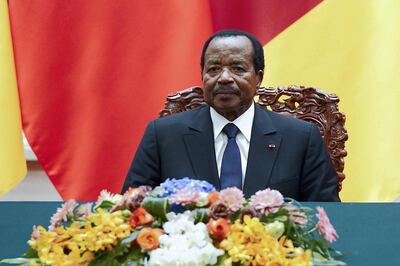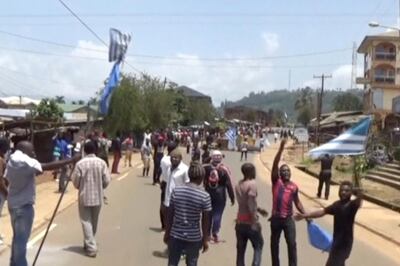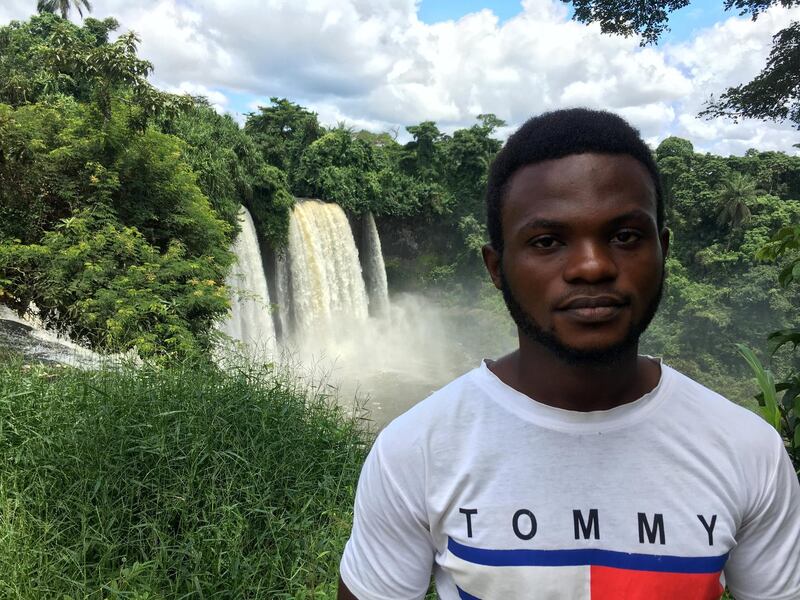SEE ALSO: Cameroon rebels outgunned in increasingly violent separatist campaign
Tumbling off a precipice flanked by dense forest, the Agbokim Falls is one of Nigeria's unsung beauty spots, a majestic torrent that attracts only a trickle of tourists.
For the latest visitors to flock here, though, its misty splendour is a sight to savour for different reasons. The 60-metre falls marks the border with neighbouring Cameroon, from where thousands of refugees are now fleeing civil war: when they finally hear the roar of the water, they know they are safe.
The latest fighting to ravage West Africa is not over the usual fault lines of religion or grazing rights, but a war of words. The refugees belong to Cameroon's English-speaking minority, born 60 years ago when British-run Southern Cameroons merged with its French-speaking neighbour.
For men like John Samuel, speaking the Queen's English used to be a badge of pride, despite losing out on jobs and opportunities in a land dominated by French-speakers. More recently, though, it has also nearly cost him his life, as a campaign by Anglophones for equal treatment has been brutally suppressed by Paul Biya, Cameroon's Francophone president.
"Government soldiers came into our town, burning down houses and firing their guns," said Mr Samuel, who is from Buea, the capital of Cameroon's Anglophone south-west region. "They shot my cousin dead, and at that point I just fled with my two young boys. We walked through the forest for three days to get to Nigeria."
Mr Samuel, 64, is among 25,000 Anglophones who have now fled to Nigeria, while another 140,000 have been displaced within Cameroon itself. The fighting has claimed the lives up to 600 people, including more than 100 security personnel killed by Anglophone "self-defence" groups.
While the conflict has had little attention from the outside world, it has already descended to "barbaric" depths, according to diplomats. Government troops have been accused of rape and pillage in Anglophone villages, sometimes burning down houses with the occupants inside. The self-defence groups, often armed only with machetes and home-made rifles, have resorted to vicious guerrilla tactics, kidnapping and even beheading soldiers.
Fighting has been intensifying ahead of Sunday's presidential elections, where Mr Biya, who has ruled since 1982, will seek a seventh term in office.
Despite a widespread boycott of the polls in Anglophone areas, diplomats believe Mr Biya will still win, if necessary by vote fraud. Yet the same stubbornness that has seen him cling to power so long has also fanned the flames of the Anglophone revolt.

Unrest among the five million English speakers broke out two years ago, when Anglophone lawyers staged street protests about plans to increase the number of Francophone judges in their British-styled courts. Rather than responding to their demands, Mr Biya replied with tear gas.
It was not the first time Anglophone demands had been suppressed: a wave of student protests in the 1990s were crushed in similar fashion. But in the age of social media, footage of the bewigged lawyers being confronted by riot police went viral, igniting wider civil rights protests that were put down with live ammunition.
Today, much of the Anglophone north-west and south-west regions are in revolt. Well-observed general strikes — known as Ghost Town days — have crippled the economy. Many schools have been shut for more than a year. In Bamenda, the capital of the Anglophone north-west region, mortuaries are reported to be filled with unidentified corpses.

Mr Biya has made some belated reforms, bringing more Anglophones into his cabinet and setting up a committee to investigate grievances. But many fear it is already too little, too late.
"Cultural and linguistic discrimination here goes back almost to the time of independence, but the way the government has responded to the recent protests has led to greater radicalisation on the ground," one western official told The National.
Paul Melly, of the Chatham House think tank, stressed that the tensions were not at "communal level" between ordinary English and French speakers. "Rather, it's about the government's failure to respond to a civil rights campaign," he said. "That has then spiralled completely out of control, with heavy-handed security responses and young men enrolling in violent armed groups."
Britain, France and the US are now pressuring Mr Biya to give more ground, aware that Cameroon is also a partner in the war against Boko Haram further north.
For many Anglophones, no amount of concessions will make amends. Many now want their own separate republic of "Ambazonia", a demand they first made at the end of the colonial era. It gets its name from the Anglophone town of Ambas Bay, a palm-lined spot on the Atlantic coast, where much of Cameroon's lucrative gas fields also lie.
Given that independence would deprive French Cameroon of much of its resource wealth, nobody realistically expects Mr Biya to cave in to the separatists' demands. But after what he saw in his village last year, refugees like James Ngomba insist that when they next head back across the Agbokim Falls, it will not be back to a country called Cameroon.
"The government soldiers shot four men in my village dead, and then two teenage girls," Mr Ngomba said. "I'm tired of being enslaved by Cameroon. I am now an Ambazonian."
Names in this article have been changed





